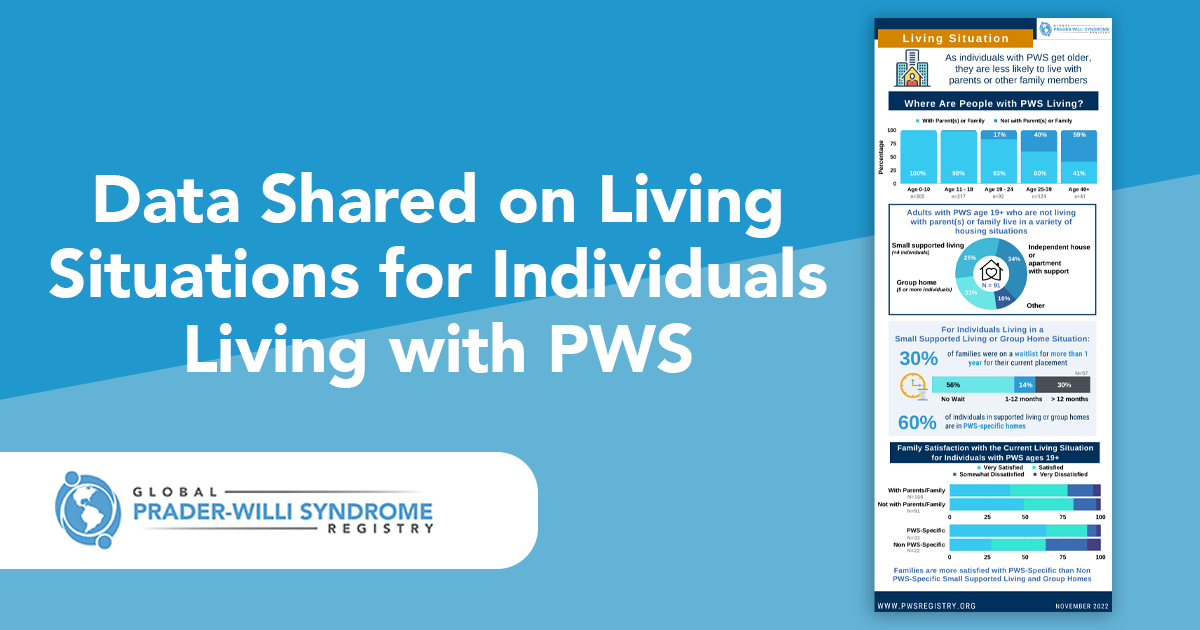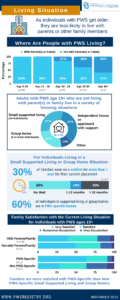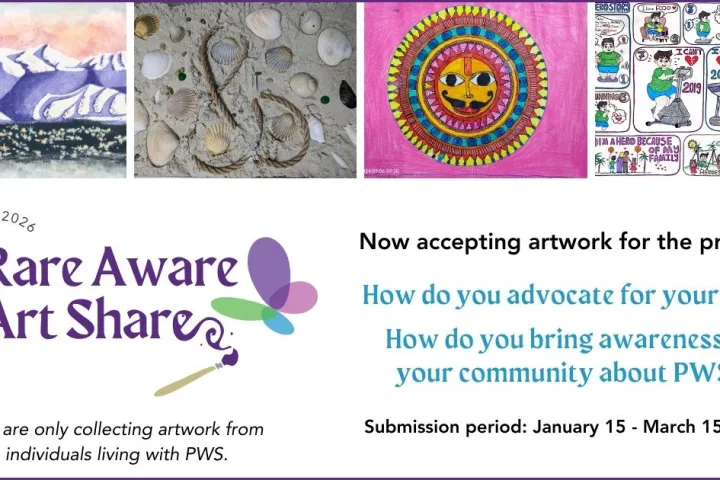Announcement from PWS Global Registry:
See infographic with visual data below.
-----------------------------------------------------------------------------------------
As individuals with PWS grow up into young adulthood and age into mid-life years, some continue to live with parents or other family, while others reside in group home or supported living situations. Here, we focus on data from the Global PWS Registry exploring where individuals with PWS are living, as well as family satisfaction with the current living situation.
Not surprisingly, almost all young children and adolescents with PWS are living at home with their parents or other family members. This begins to shift in young adult ages (19-24) years old when 17% of individuals with PWS are no longer living with parents or family, and continues to increase throughout adulthood. By age 40+, almost 60% of individuals with PWS are no longer living with parents or other family.
For Registry participants age 19+ who are living away from parents or other family members, there are a variety of living situations including independent private house/apartment with support, and supported group homes. Supported group homes can be small living situations with a handful of individuals, or a larger group home setting. The distribution among families opting for independent/private living situations, small (up to 4 individuals per home), or larger group home living situations of 5+ individuals is relatively comparable.
When looking specifically at those in a supported small living or larger group home situation, the split between PWS-specific vs. non PWS-specific homes is 60% vs. 40%. Importantly, approximately half were on a waitlist for their current living situation, with 30% on a waitlist for a year or longer. If your family is considering a small supported living or group home situation for your loved one with PWS in the near future, it is important to take this timeline into account.
In looking at family satisfaction with the current living situation, it is interesting to see that there isn’t much difference in satisfaction level whether the adult person with PWS (age 19+) is or isn’t living at home with parents/family. This suggests that preference of living situation is very much a personal/family decision. However, for those families opting for a supported small living or larger group home situation, families are much more satisfied with PWS-specific vs. non PWS-specific homes. It is important to note that these numbers specifically reflect family satisfaction level with the current living situation. This may be different than the satisfaction level of the person with PWS him/herself.
Finding the right living situation for an adult with PWS can take some time. There are many factors at play in this decision including personal relationships and health of all family members involved, independence level of the person with PWS, finances, insurance, what kinds of living situations are available in your geographical area, and more.
For more information on the Global PWS Registry, including how to join or to update your surveys, please visit https://pwsregistry.org/ or contact info@pwsregistry.org.
Share this!






 Perry A. Zirkel has written more than 1,500 publications on various aspects of school law, with an emphasis on legal issues in special education. He writes a regular column for NAESP’s Principal magazine and NASP’s Communiqué newsletter, and he did so previously for Phi Delta Kappan and Teaching Exceptional Children.
Perry A. Zirkel has written more than 1,500 publications on various aspects of school law, with an emphasis on legal issues in special education. He writes a regular column for NAESP’s Principal magazine and NASP’s Communiqué newsletter, and he did so previously for Phi Delta Kappan and Teaching Exceptional Children. Jennifer Bolander has been serving as a Special Education Specialist for PWSA (USA) since October of 2015. She is a graduate of John Carroll University and lives in Ohio with her husband Brad and daughters Kate (17), and Sophia (13) who was born with PWS.
Jennifer Bolander has been serving as a Special Education Specialist for PWSA (USA) since October of 2015. She is a graduate of John Carroll University and lives in Ohio with her husband Brad and daughters Kate (17), and Sophia (13) who was born with PWS. Dr. Amy McTighe is the PWS Program Manager and Inpatient Teacher at the Center for Prader-Willi Syndrome at the Children’s Institute of Pittsburgh. She graduated from Duquesne University receiving her Bachelor’s and Master’s degree in Education with a focus on elementary education, special education, and language arts.
Dr. Amy McTighe is the PWS Program Manager and Inpatient Teacher at the Center for Prader-Willi Syndrome at the Children’s Institute of Pittsburgh. She graduated from Duquesne University receiving her Bachelor’s and Master’s degree in Education with a focus on elementary education, special education, and language arts. Evan has worked with the Prader-Willi Syndrome Association (USA) since 2007 primarily as a Crisis Intervention and Family Support Counselor. Evans works with parents and schools to foster strong collaborative relationships and appropriate educational environments for students with PWS.
Evan has worked with the Prader-Willi Syndrome Association (USA) since 2007 primarily as a Crisis Intervention and Family Support Counselor. Evans works with parents and schools to foster strong collaborative relationships and appropriate educational environments for students with PWS. Staci Zimmerman works for Prader-Willi Syndrome Association of Colorado as an Individualized Education Program (IEP) consultant. Staci collaborates with the PWS multi-disciplinary clinic at the Children’s Hospital in Denver supporting families and school districts around the United States with their child’s Individual Educational Plan.
Staci Zimmerman works for Prader-Willi Syndrome Association of Colorado as an Individualized Education Program (IEP) consultant. Staci collaborates with the PWS multi-disciplinary clinic at the Children’s Hospital in Denver supporting families and school districts around the United States with their child’s Individual Educational Plan. Founded in 2001, SDLC is a non-profit legal services organization dedicated to protecting and advancing the legal rights of people with disabilities throughout the South. It partners with the Southern Poverty Law Center, Protection and Advocacy (P&A) programs, Legal Services Corporations (LSC) and disability organizations on major, systemic disability rights issues involving the Individuals with Disabilities Education Act (IDEA), Americans with Disabilities Act (ADA), and the federal Medicaid Act. Recently in November 2014, Jim retired.
Founded in 2001, SDLC is a non-profit legal services organization dedicated to protecting and advancing the legal rights of people with disabilities throughout the South. It partners with the Southern Poverty Law Center, Protection and Advocacy (P&A) programs, Legal Services Corporations (LSC) and disability organizations on major, systemic disability rights issues involving the Individuals with Disabilities Education Act (IDEA), Americans with Disabilities Act (ADA), and the federal Medicaid Act. Recently in November 2014, Jim retired.